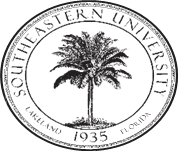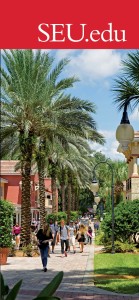August 2014
By Susan Stanley, Ed.D.
 Q: Why did you participate in the IDA review process?
Q: Why did you participate in the IDA review process?
A: In 2011, the College of Education at Southeastern University made the decision to redevelop the bachelor’s level degree in Exceptional Student Education to become a 5-year program, offering candidates a BS and MEd in Exceptional Student Education. That translated into the students becoming Florida state-certified in Exceptional Student Education K-12, Elementary Education K-6, a Middle Grades Content Area 5-9, and endorsed in Reading, ESOL, and Autism. One of the reasons for the program redevelopment was to meet the needs of the diverse populations found in our educational system. Foremost was the need to teach our pre-service teachers how to teach students with dyslexia. When the College discovered that IDA had developed Knowledge and Practice Standards for teacher preparation programs, knowing our rigorous programs interfaced well with the International Dyslexia Association’s vision and mission, we made a unanimous decision to participate.
Q: How was the experience of preparing for and participating in the review?
A: Preparing for and participating in the review was an exceptionally beneficial experience. Gathering the information that IDA required not only afforded us the ability to affirm the strengths of our programs, but also showed us the areas that needed to be updated to align with the standards. It was a team effort that was supported by the College and University’s leadership. Through that faculty collaboration, faculty across our education programs learned about IDA and dyslexia. The IDA staff and review committee were gracious, supportive, and professional. Our on-site visitor was knowledgeable and positive as we worked closely together. The process afforded us the opportunity to closely examine the details of the programs under study and continue to make program improvement for the benefit of our pre-service teachers.
 Q: What does IDA recognition mean to your university?
Q: What does IDA recognition mean to your university?
A: Our 4+1 ESE degree program is unique. At the time of redevelopment, there were only three public and/or private colleges/universities that offered a 5-year degree in ESE. The 4+1 ESE degree program at SEU is the only one that offers three certifications and three endorsements. Having the IDA accreditation has given us credibility for a relatively new program in the field. The International Dyslexia Association is a leader in the field of dyslexia and related language learning difficulties. Their recognition is that “stamp of approval” for our teachers as they move into the field of teaching with the credentials, abilities, and heart to meet the needs of these struggling learners.
Q: Describe some of the innovative ideas you have implemented to give students a richer practicum experience.
A: During their program at the undergraduate level, the candidates complete four field studies. These experiences give the students opportunities to be in the schools at each level of learning—elementary, middle school, high school, and center school—and interact with the diverse populations found in those educational environments. At the completion of the field experiences, the candidates will have logged a minimum of 180 hours in the field of ESE. During the graduate year, the candidates complete a practicum/field experience that requires the students to complete case studies on six different populations and develop Individual Education Plans, Individual Transition Plans, and Behavior Intervention Plans. The candidates are given the opportunity to compare what they have developed with the partnering districts’ plans—and to determine their strengths and weaknesses. This culminating experience occurs during the semester before the students’ capstone internship in an ESE placement. With the rigorous course work, the hours logged in the field, and the support of the faculty throughout the program, our students are very prepared to meet the challenges of teaching in Exceptional Student Education.
Q: How has your program leveraged outside partnerships to increase students’ learning experience?
A: The College of Education has worked diligently to partner, not only with the public school districts surrounding the university, but also with private schools and organizations. In their field experiences, our candidates offer a variety of skills in the classrooms that support teachers in the field of ESE. At the same time, candidates and faculty are encouraged to work in the community to demonstrate servant leadership, and they make a difference in many venues. This, too, provides outlets for our candidates to use their expertise in meeting the needs of individuals in the surrounding area. One prime example is a student who recently graduated with the BS degree in Elementary Education. She had the choice to teach in either public or private schools, but she chose to use the gifts and talents she had developed in our program to work with girls who had been caught in the web of slavery/human trafficking. This SEU graduate states that she would not be able to meet the educational needs, nor the personal needs, of these girls if she had not had the learning experiences from her time on our campus.
For information about the 4+1 ESE and Elementary Education degree programs at Southeastern University please visit: http://www.seu.edu/education/
Susan Stanley, Ed.D. is director of the Exceptional Student Education 4+1 and the M.Ed. in ESE degree programs and an associate professor in the College of Education at Southeastern University in Lakeland, Florida. You can reach her at skstanley1@seu.edu.
Copyright © 2014 International Dyslexia Association (IDA). We encourage sharing of Examiner articles. If portions are cited, please make appropriate reference. Articles may not be reprinted for the purpose of resale. Permission to republish this article is available from info@interdys.org.

